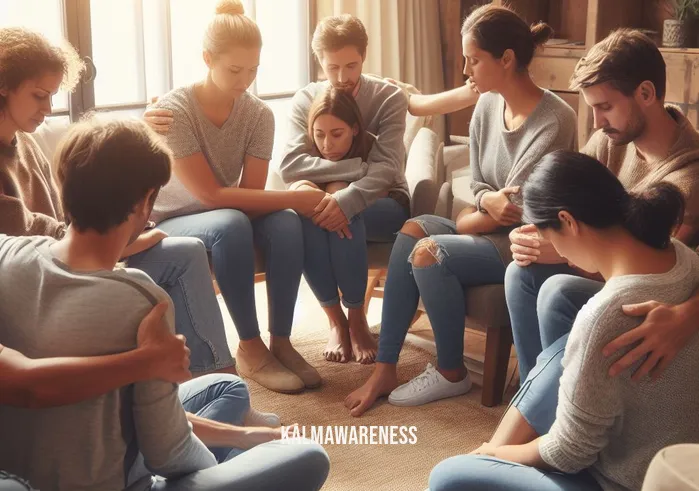Embracing the Journey of Grieving with Mindfulness
Grieving is an intensely personal and unique experience, varying from person to person. Yet, in this often-painful journey, there lies a possibility for growth and self-discovery. This is where the concept of “grieving mindfully” comes into play. It’s about navigating through the waves of grief with an awareness that is gentle, accepting, and compassionate.
Understanding Grief in a New Light
To grieve mindfully is to allow yourself to experience grief in its full intensity, without judgment or haste to move past it. It’s about acknowledging your loss and the myriad of emotions that come with it. This doesn’t mean letting grief consume you; rather, it’s about observing your feelings and thoughts as they come and go.
Mindful grieving shifts our perspective. Instead of viewing grief as an enemy to be conquered, we see it as a part of life to be embraced. This shift is crucial in healing. As you become more mindful, you learn to recognize the impermanence of your emotions, giving you the strength to face them.
Navigating Grief with Mindful Practices
Acceptance: This is the cornerstone of grieving mindfully. It’s about accepting the reality of the loss and your feelings about it. It doesn’t mean you’re okay with the loss, but rather that you acknowledge it as a part of your reality.
Mindful Breathing: When overwhelmed by grief, simple mindful breathing exercises can be incredibly grounding. They help in centering your thoughts and calming your mind. Breathing mindfully brings you back to the present moment, offering a respite from the pain of your loss.
Journaling: Writing about your loss can be a powerful tool in mindful grieving. It provides a safe space to express your emotions without fear of judgment. Reflective writing helps in processing your feelings and can bring about a sense of clarity and understanding.
Connecting with Nature: Sometimes, a walk in nature can be therapeutic. Nature’s inherent tranquility can help soothe your mind and provide a sense of connection to the world around you. Consider mindful hiking as a way to combine physical activity with mindfulness.
Integrating Mindfulness into Daily Life
It’s important to integrate mindfulness into your daily routine. Practices like meditation, yoga, or even simple mindful moments can help in cultivating an attitude of mindfulness. Websites like KalmAwareness offer resources on mindful exercises that can be easily incorporated into everyday life.
The Impact of Mindful Grieving
Grieving mindfully doesn’t necessarily lessen the pain of loss, but it changes how you relate to that pain. It encourages a healing process that is more about self-compassion and less about self-judgment. It’s a journey that takes time and patience, but it leads to a deeper understanding of oneself and a renewed appreciation for life.
Moving Forward with Awareness
As we conclude this section, let’s ponder a question: How can embracing our vulnerability during grief open doors to personal transformation? This isn’t just about coping with loss; it’s about growing from it. In the next section, we will explore the transformative power of grief and how it can lead to profound personal growth. Stay tuned for more insights on turning grief into a journey of self-discovery.

The Transformative Power of Grief: A Mindful Approach
Following the first part of our journey into understanding “grieving mindfully,” we now delve deeper into how this approach can be transformative. Mindful grieving isn’t just about coping with loss; it’s about using this experience as a catalyst for profound personal growth.
The Healing Process: Beyond Just Coping
Grieving mindfully goes beyond merely managing grief. It involves an active engagement with our emotions, leading to a deeper understanding of ourselves.
Finding Strength in Vulnerability
Embracing vulnerability during grief can be empowering. It allows us to connect with our most authentic selves, unveiling strengths we never knew we had. This process fosters resilience, teaching us to navigate life’s challenges with grace and composure.
Growth Through Grief
Grief, when approached mindfully, can be a gateway to personal transformation. It provides unique insights into our values, beliefs, and what truly matters to us. This understanding can guide us towards making more meaningful choices in life.
Practical Steps in Mindful Grieving
| Step | Description | Benefit |
|---|---|---|
| Acknowledging Emotions | Being aware of and accepting your feelings. | Facilitates emotional processing. |
| Mindful Reflection | Spending time in contemplation, perhaps through journaling or meditation. | Aids in understanding the impact of the loss. |
| Seeking Connection | Engaging with supportive communities or individuals. | Provides emotional support and shared experiences. |
The Role of Mindfulness Practices in Grieving
Mindfulness practices play a crucial role in navigating grief. Activities such as meditation, yoga, and mindful martial arts can provide a structured way to process grief. They help in centering the mind, managing stress, and maintaining a connection with the present moment.
Mindful Meditation and Its Benefits
Practicing meditation regularly can significantly aid the grieving process. It fosters a sense of inner peace and helps in managing the overwhelming emotions associated with grief. For those new to meditation, Penn Mindfulness Class can be a great starting point.
Grieving Mindfully: A Journey of Self-Discovery
Grieving mindfully is not a linear process. It’s a journey marked by ups and downs, moments of clarity, and times of confusion. However, each step in this journey is an opportunity for self-discovery and growth. It’s about learning to live with loss, not just getting over it.
Embracing the Full Spectrum of Emotions
In mindful grieving, every emotion is valid. It’s important to experience the full spectrum of your feelings – from sadness and anger to moments of joy and gratitude. This holistic approach allows for a more authentic and healing grieving process.
Looking Forward: The Path Ahead
As we continue to explore the depths of grieving mindfully, we begin to see its potential to transform our lives. It’s a path that requires courage, patience, and a willingness to face our deepest emotions. But the journey, though challenging, can lead to a profound understanding of ourselves and the world around us.
As we wrap up this section, consider this: How might the lessons learned in the depths of grief guide our future choices and relationships? This question isn’t just about finding answers. It’s about opening ourselves to new possibilities and perspectives. In the next and final part of this series, we will explore how to carry these lessons forward, integrating them into our lives for lasting impact.

Navigating Life After Loss: Mindful Grieving as a Path to Healing
In our final exploration of “grieving mindfully,” we synthesize the insights gained so far and offer actionable perspectives for moving forward. Grieving is not just an end, but also a beginning—a pathway to healing, understanding, and growth.
Integrating Mindfulness into the Grieving Process
Grief can reshape our lives in unexpected ways. Integrating mindfulness into this journey allows us to process our emotions more healthily and constructively.
Building Resilience Through Mindfulness
Mindful grieving strengthens resilience. It teaches us to accept and work through our emotions, rather than avoiding them. This acceptance builds a foundation for long-term emotional health and well-being.
Embracing Life’s Impermanence
Understanding and accepting the impermanence of life and our emotions is a critical aspect of mindful grieving. It helps us to appreciate the present moment and the transient nature of our experiences.
Actionable Steps for Mindful Grieving
Regular Meditation: Incorporate meditation into your daily routine to maintain a connection with your inner self. Meditation for Menopause and similar practices can be particularly helpful in times of emotional upheaval.
Mindful Movement: Engage in activities like yoga or mindful hiking that combine physical movement with mindfulness, helping to release emotional tension.
Community Engagement: Connect with others who are on similar journeys. Sharing experiences can provide comfort and a sense of belonging.
Applying Mindful Grieving in Daily Life
In Relationships
Mindful grieving teaches us empathy and compassion, not just for ourselves but also for others. It enhances our ability to connect deeply and authentically in our relationships.
In Personal Growth
This journey can lead to profound self-discovery. By facing our deepest emotions, we learn about our strengths, weaknesses, and true desires, guiding us toward a more fulfilling life.
In Future Challenges
The skills and insights gained from grieving mindfully equip us to handle future challenges with grace and resilience. They remind us of the importance of staying present, even in the face of adversity.
Engaging Call-to-Action for Further Learning
To continue your journey in understanding and applying mindful grieving, consider exploring additional resources. Mindfulness Books for Teens and similar literature can offer deeper insights and practical advice. Remember, learning and growing through grief is a continuous process.
Concluding Thoughts
As we conclude our exploration of grieving mindfully, let’s reflect on how this approach can transform our experience of loss into a journey of healing and growth.
- Mindful grieving involves acknowledging and accepting our emotions without judgment.
- It is a pathway to resilience, teaching us to navigate our emotions and appreciate life’s impermanence.
- Integrating mindfulness into our daily routine, through meditation and mindful movement, supports our emotional well-being.
- This journey profoundly impacts our relationships and personal growth, fostering empathy, connection, and self-awareness.
- The skills developed through mindful grieving prepare us to face future challenges with strength and grace.
As you continue to navigate your path through grief, remember that it’s not just a journey of coping but also one of discovery and transformation. Embrace each moment with mindfulness and compassion, and allow your experience of loss to open new doors to understanding and growth.





